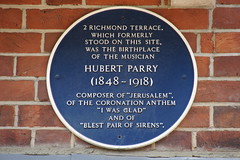Sir Hubert Parry 1st Baronet
Sir Hubert Parry 1st Baronet
(1848-1918)
musician, composer, Knight Bachelor (from 1898), and 1st Baronet Parry of Highnam Court (from 1902)
Commemorated on 4 plaques
Hubert Parry 1848-1918 musician lived here
17 Kensington Square, Kensington and Chelsea, W8, London, United Kingdom where they lived
2 Richmond Terrace, which formerly stood on this site, was the birthplace of the musician Hubert Parry (1848-1918) Composer of "Jerusalem", of the Coronation anthem "I Was Glad" and of "Blest Pair of Sirens".
Richmond Hill, Bournemouth, United Kingdom where they was born (1848)
In this house between 1881-1918 lived the musician Sir Hubert Parry 1848-1918. Composer of the setting of Blake's "Jerusalem"
Sea Lane, Rustington, United Kingdom where they lived (1881-1918)
The Kursaal. Harrogate Council's 1898 competition for the design of a Kursaal or "Cure Hall" was won by London architect Robert Beale, who worked with Frank Matcham, England's most celebrated theatrical designer. The Kursaal was opened by Sir Hubert Parry on 28th May 1903 and is the only remaining building of its type in the country. Intended to complement the town's other spa facilities the Kursaal contained many innovations that provided great flexibility of use. Renamed the "Royal Hall" in 1918, the building has been host to the greatest artists of the day - from Sir Edward Elgar to The Beatles. Following a complete restoration from 2006-8, Matcham's spectacular interior now contains more gold leaf than any similar auditorium in England. The much-loved building was reopened by HRH The Prince of Wales, patron of the Royal Hall Restoration Trust, on 22nd January 2008.
Ripon Road, Harrogate, United Kingdom where they opened




